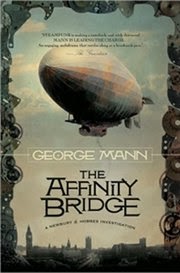What a delightful, funny find!
Before I read this book, my few encounters with steampunk had not been very successful, and I was convinced that this genre was not for me: well, Gail Carriger's Soulless (the first in the Parasol Protectorate series) changed my mind from the very beginning of Chapter One. After all, how could I resist a heroine who, seeing herself repeatedly assaulted by a hungry vampire, was shocked not so much by the attack as by the fact that “We have not even been introduced!”?
But let's proceed with order: Alexia Tarabotti lives in Victorian England - a country where vampires, werewolves and even ghosts are accepted as part of the society, as long as they conform to a series of rules dictated by BUR, the Bureau of Unnatural Registry. Part of the fun I derived from this book came from the descriptions of this strictly regimented community, with its vampire hives and werewolf packs, and regulations governing even the roves - unaffiliated vampires or werewolves. The humans observe this parallel world and its peculiar ways with the same amused curiosity we would reserve for actors, or sports stars, just to name some examples: the supernaturals are so well integrated that their differences are accepted as fascinating quirks, and are of course the subject of dinner-party gossip, but never of open fear or rejection.
Ms. Tarabotti, however, has several problems fitting into society: she's a spinster in her mid-twenties, she likes to speak her mind in no uncertain terms, her deceased father was Italian - thus bestowing on her a very unfashionable coloring and full figure - and what's worse she's a preternatural. In other words, she possesses no soul, so that contact with her can remove the supernatural qualities of other creatures: werewolves turn back into human form, vampires lose their canines, and so on.
In a world where it's been discovered that an abundance of soul is the deciding factor for surviving the change from normal human to supernatural creature, a person like Alexia is the object of both distrust and curiosity from the non-humans, thus adding to her isolation. She bears that well enough though, having created for herself a circle of friendships that include two of the best supporting characters in the book: Lord Akeldama, an old vampire quite fond of young and good-looking male minions, and Ivy, totally human but too fond of truly terrible hats.
This balance is broken on the night of the vampire assault, because Alexia is forced to kill him in self-defense: this brings her into contact with BUR and its chief, the Alpha werewolf Lord Maccon who, despite his protestations and the heated verbal exchanges between the two of them, is quite attracted to this unusual woman. The ensuing adventure, involving a dastardly scheme against the supernaturals, is tied to the inevitably developing love story between the two of them: I can say this without fear of spoiling any prospective readers, because the outcome is clear from their first encounter - what really matters here, what makes this book an entertaining, delightful read, is the way it's all handled. With spirited humor and many unconventional narrative choices.
Alexia possesses all the characteristics of the typical genre heroine: she's attractive, but in such an unconventional way that she's convinced of the contrary; she's strong and outspoken, curious and stubborn, and she's not afraid to stomp in where angels (or vampires) fear to tread. Add to the mix a stern mother, absent stepfather and two vapidly unpleasant step-sisters, and the book would resemble too much a Cinderella-like scenario, or walk down a too-often beaten path. But Ms. Carriger's writing and wickedly peculiar sense of humor elevate Alexia, and her story, far above the usual and predictable fare, regaling her readers with scenes that run from funny to saucy while mystery and romance compete for the limelight in the foreground.
If you want a book that's both amusing and exciting, this will no doubt be the perfect choice.
My Rating: 7,5/10


